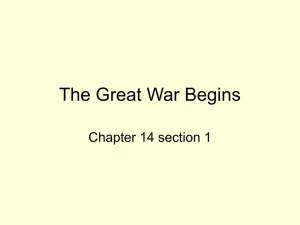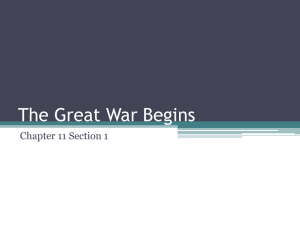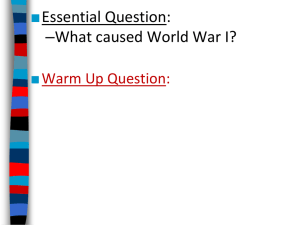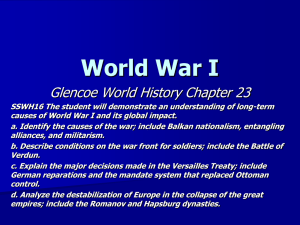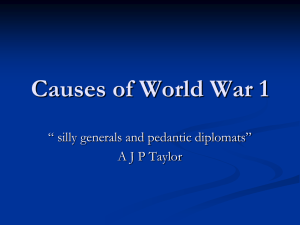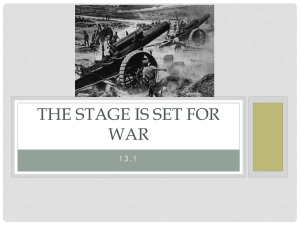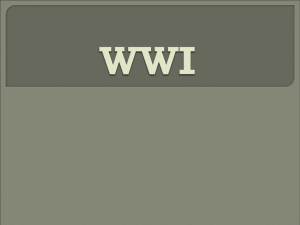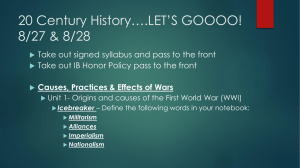Discussion work - EAL Nexus
advertisement
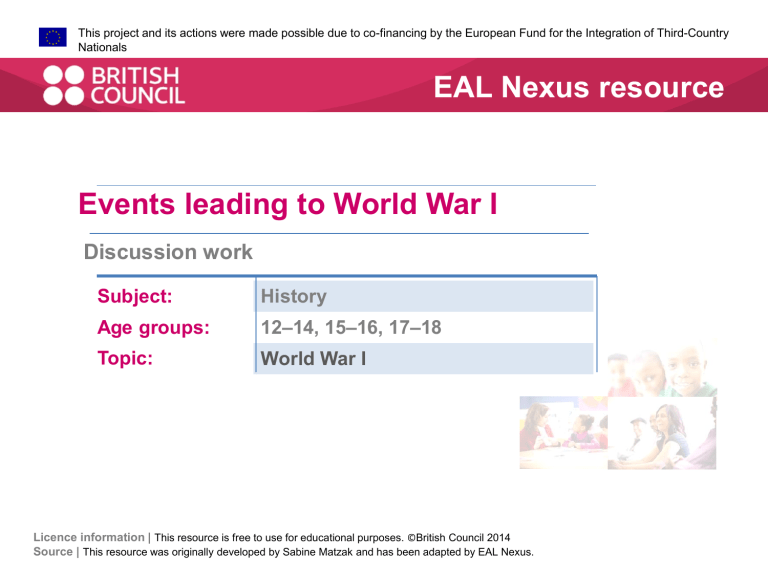
This project and its actions were made possible due to co-financing by the European Fund for the Integration of Third-Country Nationals EAL Nexus resource Events leading to World War I Discussion work Subject: History Age groups: 12–14, 15–16, 17–18 Topic: World War I Licence information | This resource is free to use for educational purposes. ©British Council 2014 Source | This resource was originally developed by Sabine Matzak and has been adapted by EAL Nexus. Who is to blame for WWI? The chain of friendship If Austria attacks Serbia, Russia will fall upon Austria, Germany upon Russia, and France and England upon Germany. If, if, if, … This cartoon was published in a US American newspaper in July 1914, around the time when Austria declared war on Serbia. People then did not know if there would be a world war. Can you finish the sentences for each country? Underline all the verb phrases. Conditional clause (if-clause) (simple present) Main clause (will- future: will [’ll] + infinitive) Serbia: If you touch me, I’ll … Austria: If you make a move, I’ll … Russia: If you hit that little feller [fellow], I’ll … Germany: If you strike my friend, I’ll … France: If you hit him, I’ll … Britain: Hi there, if you don’t …, I’ll … hit you hard. get out, I’ll have to go against you. attack you. hit you. ask my powerful friend to help me. help him. ANSWER KEY If, if, if, … This cartoon was published in a US American newspaper in July 1914, around the time when Austria declared war on Serbia. People then did not know if there would be a world war. Can you finish the sentences for each country? Underline all the verb phrases. Conditional clause (if-clause) (simple present) Main clause (will- future: will [’ll] + infinitive) Serbia: If you touch me, I’ll ask my powerful friend to help me. Austria: If you make a move, I’ll hit you hard. Russia: If you hit that little feller [fellow], I’ll attack you. Germany: If you strike my friend, I’ll help him. France: If you hit him, I’ll hit you. Britain: Hi there, if you don’t get out, I’ll have to go against you. How to argue Make sure that you give reasons for your opinion. In order to do this, you need to go back to the events. How to start your arguments There is no doubt that _________ started WW I because … The country that should be blamed for starting WW I is in my opinion _______, because … I think __________ is guilty of starting WW I because … To my mind ___________ and ____________ are both to be blamed for WW I because … I think it is fair to say that _____________ should take all the blame/some of the blame for starting WW I because … Looking at all the reasons for WW I, I come to the conclusion that __________ should take the blame because … If, if, if, … Things cannot be changed 100 years later. However, we can imagine that things might have been different if certain conditions had been different. Match the conditional clause and the main clause and underline the verb phrases. Conditional clause (if-clause) (past perfect: had + past participle) Main clause (conditional perfect: would/could/ might + have + past participle) If Austria-Hungary had not declared war on Serbia, Britain might not have entered the war. If Germany had taken a different route into France, it would not have asked Germany to withdraw from Belgium. If Britain had not had a treaty with Belgium, it might have had enough raw materials. If Germany had had more colonies, they would not have been able to support Russia. If France had not prepared their army, Russia might not have backed Serbia. ANSWER KEY If, if, if, … Things cannot be changed 100 years later. However, we can imagine that things might have been different if certain conditions had been different. Match the conditional clause and the main clause and underline the verb phrases. Conditional clause (if-clause) Main clause (past perfect: had + past participle) (conditional perfect: would/could/ might + have + past participle) If Austria-Hungary had not declared war on Serbia, Russia might not have backed Serbia. If Germany had taken a different route into France, Britain might not have entered the war. If Britain had not had a treaty with Belgium, it would not have asked Germany to withdraw from Belgium. If Germany had had more colonies, it might have had enough raw materials. If France had not prepared their army, they would not have been able to support Russia. If chain If Germany had had colonies, If Germany had not had to back Austria, it would have had enough raw materials. Austria might not have declared war on Serbia. If Germany had had enough raw materials, If Germany had not been in the Triple Alliance, it might not have been in the Triple Alliance. it would not have had to back Austria. Help for your if-sentences if-clause main clause had had / had not had would have had / would not have had NAME OF had become / A had not become COUNTRY had competed / had not competed had been / had not been would have become / would not have become would have competed / would not have competed would have been / would not have been Examples: If the Austrian successor to the throne had not been murdered, Austria would not have declared war on Serbia. If Austria had had peace with Serbia, Russia would not have had to help Serbia. The following slides are substitutions for slides 8–11 if there are problems with the copyright of any of the pictures. The real causes for WWI Germany became a successful industrial power. Germany needed raw materials and wanted power. It competed for colonies with Britain, France and other colonial powers. The Kaiser was envious of the British fleet and started to build battleships. An arms race began. Europe split up in alliances. The events leading to WWI (1) 28th June 1914 28th July 1914 * • The Austrian heir to the throne, Archduke Franz Ferdinand, was murdered by Serbian terrorists in Sarajevo (Bosnia). • Austria-Hungary declared war on Serbia. •Germany backed Austria-Hungary. •Russia backed Serbia. The events leading to WWI (2) 1st August 1914 * 3rd August 1914 • Germany declared war on Russia. • France prepared its army to support Russia. • Germany declared war on France. • German troops invaded Belgium on their way to France. The events leading to WWI (3) * * 4th August 1914 • Britain, who had a treaty with Belgium, set Germany an ultimatum to withdraw from Belgium. • Germany did not withdraw its troops. • Britain declared war on Germany.
